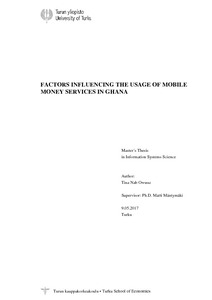Factors influencing the usage of mobile money services in Ghana
Nab Owusu, Tina (2017-10-11)
Factors influencing the usage of mobile money services in Ghana
Nab Owusu, Tina
(11.10.2017)
Turun yliopisto
avoin
Julkaisun pysyvä osoite on:
https://urn.fi/URN:NBN:fi-fe2017101150050
https://urn.fi/URN:NBN:fi-fe2017101150050
Tiivistelmä
The ambiguity and convenience of mobile phones has brought about new values and opportunities that no one foresaw in the delivery of financial services. It has brought about significant changes and sustainable growth as well as economic opportunities for the unbanked population and the emerging countries. According to the financial inclusion insights (FII), digital bank account in Ghana is more common than any other FII country in Africa including Kenya and Tanzania. Nevertheless, mobile money has not reach same penetration as that of their counterpart in Kenya and Tanzania. Mobile money in Ghana has been remittance/fund transfer focused, limiting the use of it for other financial transactions such as savings and payments of goods and services.
The main objective of the research is to investigate the critical factors influencing the full adoption of mobile money platform and its auxiliary services in Ghana by adopting the Unified Theory of Acceptance and Use of Technology (UTAUT) model. The model predicted that performance expectancy (PE) and social influence (SI) significantly affect behavioural intention to use mobile money in Ghana.
The study applied both quantitative and qualitative research methods. Questionnaires and interviews were used as primary data and then analysed using SPSS.
The findings revealed that performance expectancy, social influence, and the fact that Ghana is not a cashless economy remain the major factors limiting m-money usage in Ghana. Ghanaian consumers however are willing to use m-money but there exist significant impediments towards the adoption and use of m-money in Ghana.
The main objective of the research is to investigate the critical factors influencing the full adoption of mobile money platform and its auxiliary services in Ghana by adopting the Unified Theory of Acceptance and Use of Technology (UTAUT) model. The model predicted that performance expectancy (PE) and social influence (SI) significantly affect behavioural intention to use mobile money in Ghana.
The study applied both quantitative and qualitative research methods. Questionnaires and interviews were used as primary data and then analysed using SPSS.
The findings revealed that performance expectancy, social influence, and the fact that Ghana is not a cashless economy remain the major factors limiting m-money usage in Ghana. Ghanaian consumers however are willing to use m-money but there exist significant impediments towards the adoption and use of m-money in Ghana.
